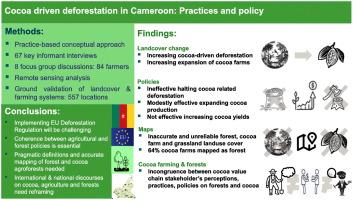喀麦隆可可驱动的森林砍伐:实践与政策
IF 3.8
2区 农林科学
Q1 ECONOMICS
引用次数: 0
摘要
自2000年代以来,在提高生产力、产量、农民收入和国家收入的政策支持下,喀麦隆的可可产量有所增加。其他政策鼓励零毁林生产和森林保护。然而,可可种植导致森林砍伐和土地退化。缺乏实践-政策相互作用的科学证据。在这种背景下,我们确定了关于森林砍伐和可可的观念、农业实践及其对地面的影响、政策和倡议。基于实践的概念方法指导了Ntui周围557个地点的67次访谈、8次焦点小组讨论以及土地覆盖和地面验证的遥感分析。在过去十年中,小规模的可可驱动的森林砍伐不断增加,共计4599公顷。地图显示,观察到的可可农场中有64%是森林。农民不认为自己有责任,他们将森林砍伐归咎于贫困、低产量、土地不可用、移民、人口增长以及土地和劳动力价格高企。除了可持续性认证之外,农民对零毁林倡议和政策一无所知。政策在阻止与可可相关的森林砍伐或提高产量方面似乎无效,但在扩大产量方面效果一般。减少森林砍伐的机会包括提高产量、提供信息、执法和土地规划。然而,生产力的提高可能会进一步推动森林砍伐。矛盾的是,与其他价值链利益相关者相反,农民认为生计和森林利用之间没有权衡。这些结果为连贯的森林和农业政策、务实的森林和农林业定义、准确的(农业)森林制图以及基于证据的可可、农业和森林话语重构提出了建议。不一致的观念、做法和政策对欧盟森林砍伐条例的实施构成挑战。本文章由计算机程序翻译,如有差异,请以英文原文为准。

Cocoa driven deforestation in Cameroon: Practices and policy
Cocoa production has increased in Cameroon since the 2000s, supported by policies to enhance productivity, yields, farmer incomes and state revenues. Other policies incentivize zero-deforestation production and forest protection. However cocoa farming practices cause deforestation and degradation. Scientific evidence of practice-policy interactions is lacking. Given this context we identified perceptions, farming practices and their on-ground impacts, policies and initiatives addressing deforestation and cocoa. A practice-based conceptual approach guided 67 interviews, 8 focus group discussions and remote sensing analysis of land cover and ground validation in 557 locations around Ntui. Increasing, small-scale cocoa-driven deforestation, totalling 4599 ha over the past decade was found. Maps show 64 % of observed cocoa farms as forest. Farmers do not perceive themselves as responsible, attributing deforestation to poverty, low yields, land unavailability, migration, population growth, and high land and labour prices. Apart from sustainability certification, farmers were unaware of zero-deforestation initiatives and policies. Policies appear ineffective in halting cocoa-related deforestation or increasing yields, but modestly effective in expanding production. Opportunities to reduce deforestation include yield improvement, information, law enforcement, and land planning. However productivity increases could drive further deforestation. Paradoxically, farmers perceive no trade-offs between livelihoods and forest use, contrary to other value-chain stakeholders. These results lead to recommendations for coherent forest and agricultural policies, pragmatic forest and agroforestry definitions, accurate (agro)forest mapping, and evidence-based reframing of discourses on cocoa, agriculture and forests. Incongruent perceptions, practices and policies challenge implementation of the EU Deforestation Regulation.
求助全文
通过发布文献求助,成功后即可免费获取论文全文。
去求助
来源期刊

Forest Policy and Economics
农林科学-林学
CiteScore
9.00
自引率
7.50%
发文量
148
审稿时长
21.9 weeks
期刊介绍:
Forest Policy and Economics is a leading scientific journal that publishes peer-reviewed policy and economics research relating to forests, forested landscapes, forest-related industries, and other forest-relevant land uses. It also welcomes contributions from other social sciences and humanities perspectives that make clear theoretical, conceptual and methodological contributions to the existing state-of-the-art literature on forests and related land use systems. These disciplines include, but are not limited to, sociology, anthropology, human geography, history, jurisprudence, planning, development studies, and psychology research on forests. Forest Policy and Economics is global in scope and publishes multiple article types of high scientific standard. Acceptance for publication is subject to a double-blind peer-review process.
 求助内容:
求助内容: 应助结果提醒方式:
应助结果提醒方式:


